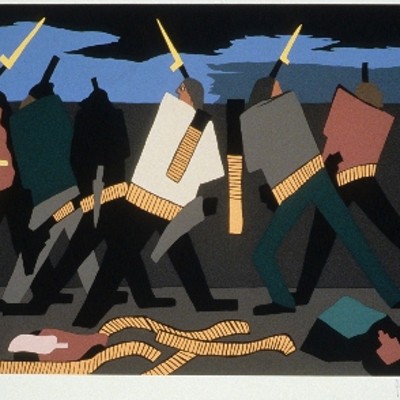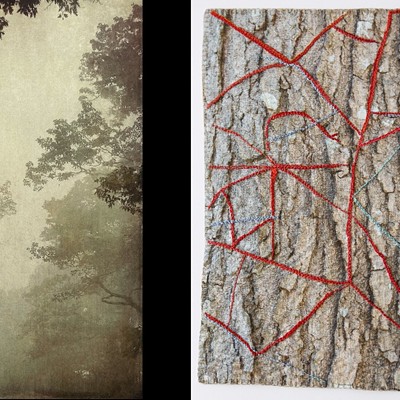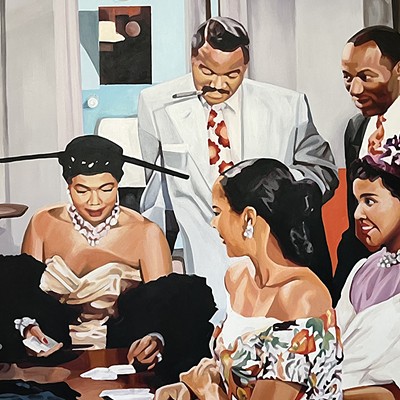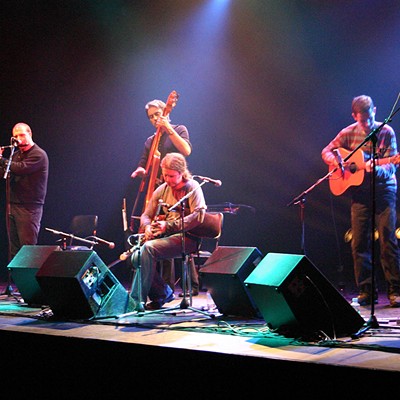When a reporter shows up at the home of his master, choreographer and dancer Thom Lewis, the dog and his canine sidekick, Spot, lunge the front gate, apparently in an effort to show off their dancerly skills. But both dogs are out of luck this year. In its third annual concert, The Gift of Years, this weekend at Leo Rich, FUNHOUSE sticks with its mission of telling stories in dance, but none of the tales details a dog's life.
Instead Lewis and Lee Anne Hartley, co-artistic directors of the modern dance troupe, called on far more esoteric topics for the concert's three works, two of them premiers. Lewis, recent winner of the Mayor's Arts Award, says his new "Women hold up half the sky" is inspired equally by the musings of Mao Tse-Tung, the mythological research of Joseph Campbell and the real-life lives of women. His "Everlast," a favorite from his Tenth Street Danceworks days, sorrowfully chronicles the breakup of a marriage. Hartley's "A Distant Mirror" draws from the biography of a medieval French knight.
"How do you tell stories with dance?" asks Hartley rhetorically, as she lounges on Lewis' patio on this sun-kissed late winter day. The dogs, disappointed at losing the limelight, are now lying quietly nearby. "We're developing the skills more and more each year."
FUNHOUSE is dedicated to the proposition that modern dance does not have to be of what Lewis calls the "kvetch and moan school." Jazzed up with costumes mostly created by Lewis' wife, the artist Mary Curran, and embracing visual art and some live music (and dogs), the troupe of pick-up dancers and young apprentices aims for lively concerts with unexpected twists.
Last spring, Hartley presented a dance that lovingly re-created the marriage of her late parents; the year before, she ambitiously tackled the story of the ancient female mathematician Hypatia. This time around, "A Distant Mirror," an elaborate 45-minute dance for 13, is based on the Barbara Tuchman tome of the same name, a history about a knight making his way through plague and war. Hartley first composed the dance 15 years ago in Seattle, where it was performed, but she has revised it to such an extent that she considers it a new work.
"Before it was much more abstract, but now it's more of a story," she says.
A contemporary carnival scene bookends the time-traveling tale, in which the Fool, danced by Hartley herself, journeys through the medieval past, then the present and the future. Dual-threat artist Julia Miller, a painter who dances in the show, painted large tarot cards; projected behind the stage, they conjure up scenes of everyday life, plague, war and religion. (The original paintings will be displayed in the lobby during the concert.)
The point of the book, and of the dance, Hartley says, is that "we don't take the time to look at the past and how it relates to our lives. Tuchman's metaphor--the mirror--is about how we can see ourselves in a distant time period. These characters are speaking to us."
Rereading the book after the attacks of September 11 and the start of war in Afghanistan, Hartley says she was struck even more by how little has changed since medieval times. "The past is not so distant. The kinds of choices we make are not so different; it's just that now we have the camouflage of luxury."
Assorted local dance companies contribute some of the baker's dozen of dancers in the work. NEW ARTiculations provides Cindy Alm, ZUZI Move It Dance Company has lent Yumi Shirai and Orts Theatre of Dance contributes Charles Bibilos. Carolyn Minor, formerly of Momix, plays the fortune teller. Lewis takes a turn as well, and as do Kim Fleming, Jack Wiley and Mirea Pineda and the five young teens who last year danced the Pound Puppies.
A tapestry of music includes fragments from the original score composed 15 years ago by Arturo Peal of Seattle, as well as "medievalesque folk music, religious music, industrial rock, Judy Collins, the Eurythmics and Sheryl Crow." Pound Puppy Claire Graham sings the opening bars of "The Battle Hymn of the Republic."
Lewis last year choreographed the sad story of a missing dog; the year before he celebrated the circus in dance. This time around he's aiming a little closer to social commentary, made possible, he says, by the perspective given by his own "gift of years." Notwithstanding the complicated genesis of "Women hold up half the sky," he says the new piece is "simple. It's about women."
The title is taken directly from a Mao pronouncement. "Men talk about thunder and lightning as if they invented them," Lewis says. "Women ponder the time in between and create rain."
Thus the work begins with lightning and ends with thunder, and "28 minutes of stuff happens in between." Less a story than a meditation on contradictory ways the culture treats women, the dance is full of gestures Lewis has observed in real life. A mother lovingly brushes the hair of her teenage daughter, and the girl walks away without giving her mother any acknowledgement, much less thanks. A woman follows behind her children, picking up after them wherever they go.
"The community walks with women," Lewis observes, "and then pushes them."
But the dance's female rainmakers don't take this lying down. The five "really great" women dancing--Miller, Kim Fleming and NEW ART's Tammy Rosen, Leigh Ann Rangel and Carolyn Merritt--gradually gain strength, ending up with an Amazonian sequence rendered in hip-hop power gestures. Orts' Charles Thompson dances the male lead, accompanied by Bibilos and Wiley, and the Pound Puppies return. The music is a collage of Orbital, Beethoven, Meredith Monk, Radiohead and the Canadian Celtic group Mad Pudding.
"The music does reflect how some relationships go," Lewis says. "It starts out sweet and romantic and ends caustic."
"Everlast" dips into a relationship towards its end. For this wonderful duet last seen in these parts in 1998, Lewis teams up with local favorite Annie Bunker, artistic director of Orts. (The pair co-founded Orts years ago, Lewis says, along with Daniel John.) Armed with red boxing gloves, the dancers grapple angrily with each other to the tunes of Lyle Lovett. The lament for a dying marriage tells "the same story twice," Lewis says. "Then the tone changes.
"She takes off her gloves. She's not even willing to fight anymore."











